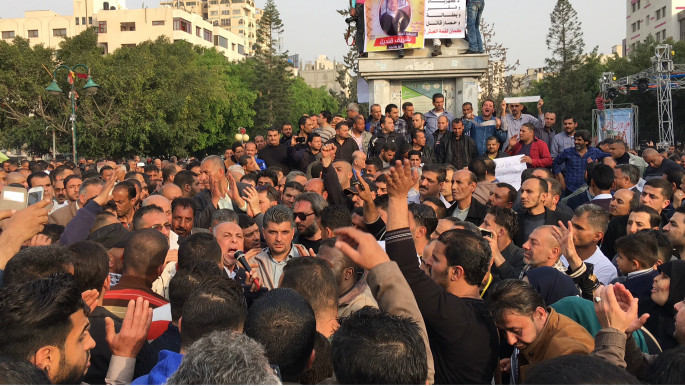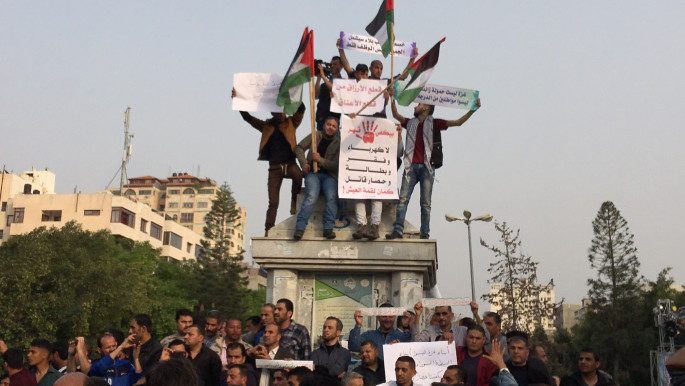
Salary cuts: A new suffering added to Gaza
A decision by the West Bank-based Palestinian Authority to impose pay cuts on its civil servants in the Gaza Strip sparked anger among the employees on Wednesday. Some employees in the PA ministry of education said they received as little as 30 percent of their usual salary.
The 70,000 PA employees in the Hamas-run Gaza Strip are in a bizarre position.
In 2007, Hamas seized power from the rival Fatah movement of Palestinian President Mahmoud Abbas and ousted the Fatah-dominated PA.
Its staff lost their posts, but the PA kept them on its payroll nevertheless.
Hamas set up its own parallel administration with 50,000 staff, whose salaries the PA refuses to pay.
The PA claimed that a reduction in foreign aid from EU and Western countries left it unable to pay full salaries as its budget was hit. The workers called this unfair because the cut decision was only applied on PA Gaza civil servants and not on workers in the West Bank.
 |
|
| Protests take place in Gaza [Mohammed Arafat] |
Yousif al-Mahmoud, a spokesman for the Palestinian Authority, said that the cuts were due to a financial crisis as foreign financial aid to the Authority was decreased to about 70 percent in comparison to previous years.
"Salaries cuts were made only to salary bonuses, without any cuts from original salaries," he added.
Mahmoud also accused Hamas of being a part of the crisis saying that it "collects government revenues without sending it to the Palestinian Authority's treasury."
Rejecting Mahmoud's justifications about the financial crisis, Waleed el-Ewad, a member of the Palestinian People Party's political desk, said that if salary cuts were caused by a financial crisis, then the cuts would be made to PA employees in the West Bank too, not only in the Gaza Strip.
The Palestinian Centre for Human Rights did not accept the PA's explanation as well saying that the claims contradict financial reports that show the PA’s income recently improved.
Moreover, both the Democratic Front for the Liberation of Palestine (DFLP) and the Palestinian National Initiative (PNI) condemned the decision saying that it's illegal and unacceptable, adding that this measure might bring more dangerous measures against the Strip and its people which would segregate Gaza from the rest of Palestine.
Calling the decision abusive and irresponsible, Fawzi Barhoum, Hamas movement's spokesman, urged the Palestinian Authority to reverse the decision immediately.
"We are in solidarity with all of the PA employees without exceptions," he added, and urged the Palestinian government in the West Bank to, "stop discriminating between Palestinians in the Strip and the West Bank."
To discuss the decision, Palestinian movements and parties in the Gaza Strip have decided to hold a meeting as soon as possible.
Directly after the decision, dozens of leaders from Fatah submitted their resignation, including the secretary of the party in northern Gaza, Hatem Abu el-Hesain, who said that he told the central agency about his decision along with the rest of northern Gaza's members.
 |
|
| Protests take place in Gaza [Mohammed Arafat] |
Meanwhile, Palestinian MP and exiled Fatah member, Mohamed Dahlan, attacked Palestinian President Mahmoud Abbas and the PA over the decision, calling it a "crime."
"Far from all ethical and moral bases, Abbas and his administration committed a big crime targeting our people in the enclave," he wrote on his Facebook page.
Dahlan, who now lives in the UAE, called for protests inside the Gaza Strip and in its diaspora, "not only due to the economic consequences of the salary cuts, but because this decision deepens the internal division between Fatah and Hamas."
On the other hand, hundreds of PA civil servants gathered in the Unknown Soldier’s square in the centre of Gaza city to protest against the cuts asking the government to withdraw the decision immediately.
Expressing shock, anger and frustration, Ahmed Abu Khater, a protesting PA employee, said that the cuts affected him negatively after he found his monthly pay cheque of NIS 4,000 ($1,100) had been reduced to NIS 1,540 ($400).
"I live in a rented home with my family of eight, including three university students that need about 1300NIS (350$) monthly."
Sameh Obaid, is also a disheartened and shocked employee, whose salary was cut to only NIS 50 ($15).
"I am ready to die now," Obaid cried. "I am not valued anymore. What shall I tell my children who are waiting for me at home?"
The Ministry of Health stated that dozens of PA staff were taken to hospital, highlighting the perilous impact the decision had on people in Gaza.
In the most extreme case, PA worker Shareef Qandeel died from a heart attack after he had gone to the bank to withdraw his salary, only to find nothing in his account.
Mohammed Arafat holds a bachelor degree in Teaching English as a Foreign Language and is preparing for a Masters in Peace and Conflict Studies. Author of, Still Living There, a book documenting Gaza's last war and its aftermath.
Opinions expressed in this article remain those of the author, and do not necessarily represent those of The New Arab, its editorial board or staff.





 Follow the Middle East's top stories in English at The New Arab on Google News
Follow the Middle East's top stories in English at The New Arab on Google News


